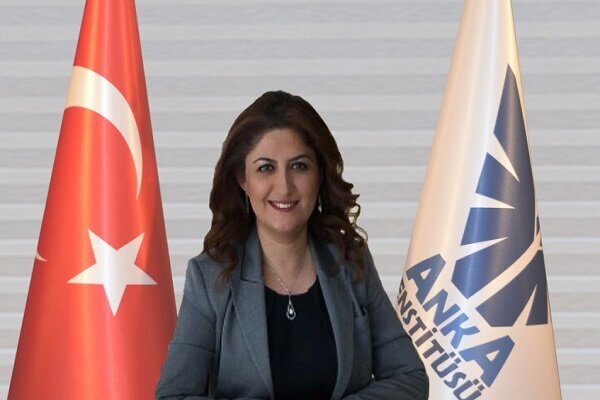Potential Clash Between Turkey and Israel in Syria Looms

Mehr News Agency, International Desk – Azar Mahdavan: Recent developments in the region have set Turkey and Israel against each other.Following Israel’s attack on Qatar under the pretext of Hamas delegation presence in Doha, similar security concerns have emerged in Turkey. turkish officials, including President Erdogan, have repeatedly described this situation as a potential threat to Turkey. various views have surfaced regarding possible Israeli attack plans against Turkey and their regional implications.
Simultaneously occurring, Turkey’s acquisition of the S-400 defense systems and its repercussions within NATO once again place Ankara’s military and strategic position under scrutiny. Factors such as collaboration between Greece and Israel are also seen as instruments used to exert pressure on Turkey.
In an interview with Yeşim Demir, an international relations analyst, key assessments were offered about current Turkish-Israeli relations, possible attack scenarios, regional power balances, and how these influence Turkey’s defense policies.
The full interview is as follows:
After Israel’s strike on Qatar, warnings emerged in turkey about a possible Israeli attack. While some linked this concern to Hamas’ office in Turkey, Turkish officials-including President Erdogan-frequently refer to the likelihood of an Israeli assault against their country. During the 12-day war imposed on Iran (may 2021), similar rhetoric was heard.Do you believe such an attack is feasible?
The allegations that Israel is planning attacks against Turkey are not new. These rumors arose partly due to Ankara’s support for Tehran during Israeli strikes on Iran. Recent statements concerning Jerusalem have reignited these debates.
Amichai Chikli-the Israeli Minister for Jewish Communities Abroad and Combating Antisemitism-described Recep Tayyip Erdogan as a leader aligned with the Muslim Brotherhood who seeks Ottoman Empire revival while supporting Jerusalem’s annexation into that empire framework; he also labeled Turkey alongside Qatar and Syria as “the new axis of evil.” Such remarks underline a deepening Cold War-like tension between the two countries.
Similar viewpoints appear widely within Israeli media: issues like Turkish influence in Syria; neo-Ottoman ambitions; discussions around Akuyu nuclear power plant projects all figure prominently. Some argue that given possibilities of uranium enrichment activities by Ankara there should be enhanced Israeli capabilities for striking military facilities inside Turkey if necessary.Additionally,Israel portrays Ankara’s claim to being a regional power as threatening strategic equilibrium.
While this kind of rhetoric raises concerns over direct military confrontation risks,it seems unlikely any large-scale direct intervention by Israel will occur against turkey.Instead,classical measures probably involve targeted assassinations or precision operations aimed at Hamas members reportedly present inside Turkish territory.Having mentioned that,such efforts could severely worsen bilateral ties & destabilize regional balances considerably.
The recurring question “IsTurkey next?” ought rather be examined through political discourse & perception management lenses.Turkish-Israeli relations historically experienced ups & downs.
Though recent developments might increase odds for direct combat,this remains improbable consideringTurkey -a NATO member- maintains close bonds with USA,andIsrael stands america’s key allyin Middle East.A more realistic possibility involves indirect confrontations occurringwithin Syria through meanssuchas psychological warfare,intelligence operations,and assassination attempts remaining active options moving forward.
IfIsrael refrains from attackingTurkey directly what other tools does it wieldtoexert pressure?As an exmaple,some interpret cooperationbetween GreeceandIsraelasa political lever Tel Aviv usesagainstAnkara.
This supposed leverage attributedtoTel Aviv mainly involves indirectpressure throughregional partnershipsrather than overtmilitarythreats.Such as,theadepositsandstrategic Mediterranean positionunderpinIsraels allianceswithSouthCyprusandGreece.Jointmilitary exercisesin these frameworksoccasionallypresent tangiblesecurity threats vis-à-visTurkey.As tensions escalateoverAegean islands&economic zones,Greece perceives clear backingfromIsraeland recentlyintroduced its “Achilles Shield”defense program integratingIsraeli systems likeIron DomeandSpider missile batteries into its arsenalimproving deterrence posture considerably.
Additionally,lastmonth Greece requestedthat IsraelexplicityrecognizePonticGenocideclaims,sparkingpotentialadditional strainonTurkish -Israelirelations.Still,given prior refusalsbyIsraeltorecognizeArmenianGenocidecomplaints,this requestprobablywon’treceivepositive responses.Aside from riskingAnkara ties,it might agitate connectionswithAzerbaijan to,further complicating diplomacy tuned closelybetweenIsrael&Azerbaijan
Meanwhile intelligence & militaryrelationsbetween Israe l& Kurdish groups insouthernSyria/Iraq alsocontributeanother dimensionof leverage.This complicates border security dynamicsin areas abuttingDiffering turf favored by both Kurdish factionsand Turk ishnational interests.
Beyond armedstrategy,economic factors remain viablepressure levers becuase control over energy resources& trade routes,& consequentlyeconomics-securityinterlinkagesCreatetransnational dependencies.Israel& allies dominatingkey pathways possibly restrictaccessoropsent pressures indirectlyagainstTurkishinterest flows .
In2017,TurkeyprocuredS-400systemsfromRussiaafterWASHINGTONrefusedprovidingPatriotMissiles.Stillun-deployedofficially,strong reports occasionallycitepossiblereturns.Takingintoaccount’presence’aroundTurley bordersdo Israelisneed heightnedattention totheirpotentials?
These acquisitions prompted intenseNATOconcerns alon gwithUSsanctions.ReportsthatTurkeyintendsbuildingabasedintheSyrianterritory forthe deploymentoftheS-400haveledetalied scrutiny.Israeli-Greek lobbiesinsidetheUnitedStatesreportedlyopposeacts raisingthis risk aggressively.An exclusivebriefingfloatinginthesphereclaimedIsraeliattacksapproachingSyria communicate messages preventingtheestablishmentofTurkishbasestherewhilemaintainingoperationalfreedomtostrikeanydesiredtargetsonSyriangrounds-includingzonal liberties vis-à-visTurkey-related targets!
thus,the proximate presenceof Israelisalongside Turkishborder linesplaysakey role underpinningAnkarasecuritypolicies.This buyingdecision doesnotexpress repudiation toward Isra elspecifically butaimsatboostingtactical deterrenceandsafeguardcapabilitiesinthebroaderregionalcontext.Militarystrength enhancementismain priorityhelpsthem maintaincontrol beyond immediate boundaries.For now,Turkeystrategyalsoincludesendeavors developingdomesticmilitarytechnologywhichwillreduce futuredependenciesbothonstatesupplierslikeUSorRussian-origin equipment reinforcingits standingasa pivotalsecurityplayer shaping ongoingregionalgeopolitics.Latestongoingprojectspredicta gradual evolutionintoacontender capableoffending convergence amidcompeting interests acrossMiddleEast geopolitics gradually shapingposturesin defenseforcingalliances toward securingbothinternal&sensitivefrontlinepositions simultaneously..


